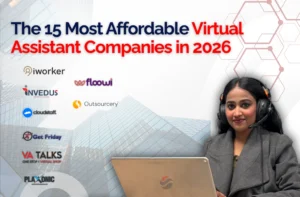
How a Virtual Assistant for Psychiatry Can Help You Reclaim 10+ Hours a Week
Psychiatrists’ typical day starts very differently from most. They’re not just seeing patients, they’re also coordinating with insurance representatives, filling empty appointment slots, managing paperwork, and following up on after-care.
That’s hours spent on tasks unrelated to actual patient care. So the question is: can you practice psychiatry more?
Yes, you can. A virtual assistant for psychiatry is a trained remote professional who has been handling the non-clinical responsibilities of psychiatric practices for years. Solo practicing clinicians can reclaim their time, reduce burnout, and offer patients better, more consistent access to care.
Let us show you how you can save 10+ hours a week, see more patients, and stress less with psychiatrists VA for therapist services.
Why Psychiatrists Need Virtual Assistants More Than Ever?
Psychiatrists are medical professionals who commit themselves to serving people with serious mental illnesses. They have to prepare prescriptions if necessary and refer them to counselors or therapists. With so much to keep in mind, the cost of emotional overload becomes too much.
According to studies, about 48% of psychiatrists experience burnout, which is average with other healthcare professionals. Yet, most don’t know that virtual assistants for psychiatrists can be a helping hand in sorting and managing half of these non-clinical tasks.
These VAs are experts at handling patient calls, updating EHRs, rescheduling no-shows, and chasing insurance approvals. There are some common tasks that are stealing away your time and making you distant from better psychiatric care and practice:
- Session note formatting and EHR documentation
- Managing patient calls and follow-up logistics
- Sending pre-appointment assessments and reminders
- Coordinating cross-provider communication
- Insurance form handling and eligibility checks
- Organizing digital files and patient records
- Inbox triaging and administrative email replies
What a Psychiatry-Focused Virtual Assistant Can Do for You?
Psychiatric practices juggle a mix of emotional labor, documentation, and client coordination. That’s why we’ve categorized virtual assistant for psychiatrists responsibilities into four key areas. Each reflects the real-world pain points faced by psychiatrists in solo or group settings.
This structure helps you visualize how virtual assistants for mental health practices can become a dependable support system for your daily or weekly burdens.
And remember: you can start with just 5 hours a week and grow from there.
Administrative Relief
Your VA keeps your practice running behind the scenes, so you can stay focused on care.
- Calendar management and appointment slot optimization
- Professional email filtering and inbox zero maintenance
- Transcription of session recordings into EHR-ready notes
- Formatting of SOAP notes or treatment plan summaries
- Document preparation: letters, prescriptions, treatment outlines
- Digital file organization and cloud-based chart management
- License renewals, CME tracking, and reminders
- Internal SOP and workflow documentation
Patient Coordination
Ensure no patient slips through the cracks, whether it’s follow-ups or first impressions.
- New patient onboarding and form assistance
- Sending and tracking intake packets and digital consent forms
- Appointment reminders via email/text (automated or manual)
- Rescheduling and no-show follow-ups
- Coordination with labs, pharmacies, and external providers
- Sharing pre-session screeners (PHQ-9, GAD-7, etc.)
- Uploading lab results or communicating medication updates
- HIPAA-compliant patient portal support
Billing & Claims Support
Let your VA handle the billing cycle so revenue flows and patients stay informed.
- Insurance eligibility checks before the first sessions
- Submission of pre-authorization forms
- Filling and submitting insurance claims
- Following up on delayed or rejected claims
- Creating and managing patient payment plans
- Sending invoice reminders and collecting payments
- Generating superbills and coding documentation
- Updating insurance data in EMR systems
Growth & Outreach
Because even mental health practices deserve seamless branding, retention, and referrals.
- Managing online reviews and patient testimonials
- Formatting and scheduling email newsletters
- Uploading and formatting social media content
- Tracking referral sources and follow-ups with referring clinicians
- Updating bios or profiles on Psychology Today, Zocdoc, etc.
- Creating welcome email flows or journey automation
- CRM data entry and client tagging
- Basic website updates or blog post formatting
How Much Time Can You Really Save with Psychiatrists VA?

The American Psychiatric Association defines how much an average psychiatrist works. In total, psychiatrists spend about 48 hours per week, investing approximately 60% (about 29 hours) in direct patient care and the remaining 40% (about 19 hours) on non-clinical tasks.
According to our research, a healthcare virtual assistant for psychiatry can save you up to 10+ hours weekly. That’s a tall claim, especially considering that this 1 virtual assistant psychiatry = 1 extra day of billable sessions.
However, we have done a full breakdown of which tasks virtual assistants for psychiatry tackle to save you precious time for your business and how they do it.
1. Calendar Management & Appointment Logistics (Save 2-3 Hours/Week)
Psychiatrists often spend valuable time rescheduling no-shows, coordinating multi-party appointments, confirming time slots, and coordinating back-and-forth emails. Being the only link between the patient and the practice, it is quite demanding to be active in client coordination communication.
Here is how a VA finds the solution:
A virtual assistant for psychiatrists manages your calendar using HIPAA-compliant scheduling tools, confirms appointments ahead of time, sends follow-ups and reschedules cancellations.
Compared to a psychiatrist manually managing this, a VA can save up to 30 minutes daily, which adds up to 2 to 3 hours weekly. Hiring a virtual assistant for psychiatry means 3x faster scheduling. This happens as most VA psychiatrists use tools, such as JaneApp, SimplePractice, Luminello, TherapyNotes, and Calendly (HIPAA-compliant plan) to focus on automation and no human-error approach.
2. EHR Documentation & Note Formatting (Save 3-4 Hours/Week)
Post-session SOAP notes, treatment updates, clinical summaries, and record uploads take up hours, especially when juggling multiple clients per day. Usually, psychiatrists have to maintain these notes as they are considered medical health records of a patient that are used for several other treatment purposes. Hence, virtual assistants for mental health practices take this task quite seriously.
What a VA does differently:
A healthcare virtual assistant for psychiatrists can pre-format templates, transcribe audio notes, organize files, and prep your EHR before and after sessions. This is possible because many virtual assistants for psychiatrists and mental health practices get trained in documentation and note-taking. Well-trained VAs can perform with an accuracy of 90% and 98%.
For psychiatrists who spend 20 to 30 minutes per patient on notes, a VA streamlines this by up to 60%, saving 3 to 4 hours per week easily.
3. Patient Communication & Coordination (Save 2 Hours/Week)
Patients need constant reminders and calls about their appointments or follow-up sessions. Calls and emails related to reminders, paperwork, lab updates, or prescription follow-ups can be given to a dedicated receptionist, but the depth these tasks need is not met by them. Hence, disruptions and delays in clinical work can happen.
The smart way a virtual help resolves it:
Virtual assistants for psychiatrists handle patient communication (via phone, email, EHR portals, or messaging tools) and non-clinical patient touchpoints (appointment booking, intake processing, billing queries, and follow-ups) within minutes and update it across relevant systems.
With structured SOPs, a VA manages this 2x faster than a clinician would, freeing up approximately 2 hours weekly on average.
4. Billing, Claims & Insurance Follow-Up (Save 2-3 Hours/Week)
Billing is a tricky thing when it comes to psychiatric and therapy practices. Firstly, things like CPT codes (Current Procedural Terminology) need to be defined based on session duration, type, and provider. Then, special mental health parity laws require prior authorizations and medical necessity reviews (as insurers cap psychiatric benefits). Moreover, there are no-show charges to be taken from the insurance and out-of-network complications. These determine the reimbursement rates and documentation requirements.
VAs follow the proper process for insured and private pay individuals:
Process for Insured Patients:
- Confirm mental health coverage, CPT codes, copays, and session limits.
- Submit diagnosis/treatment plan for approval before the session.
- Deliver care and document with correct ICD-10 & CPT codes.
- Send electronically via a clearinghouse or EHR system.
- Insurance approves or denies based on eligibility or errors.
- Charge for any balance (copay, deductible, or denied amounts).
Process for Private Pay Patients:
- The full session fee is paid upfront or after the session.
- Patients with out-of-network benefits submit a superbill for reimbursement.
- Fewer admin steps for the provider; the patient manages insurance.
Trained virtual assistants for psychiatrists to make sure the process is followed thoroughly to verify coverage, chase unpaid claims, submit superbills on time, and resolve insurance queries.
Practices report that VAs complete these tasks between 40% to 50% faster than in-house staff. The result? About 2 to 3 hours saved per week, with cleaner claims and faster payouts.
5. Growth & Marketing Admin (Save 1-2 Hours/Week)
Promotion is an equally important part of a psychiatric business. In theory, marketing and growth initiatives either require an agency or a dedicated person. However, your practice may not have the budget to hire an agency for marketing efforts.
An experienced virtual assistant for psychiatrists may have the right tools or knowledge to help you with your brand-building and social channels. The most common tasks you can delegate to them are:
- Updating clinician or clinic bios on websites and directories
- Publishing blogs or mental health articles on the website
- Formatting and sending newsletters to patients or subscribers
- Uploading and scheduling social media posts
- Following up with referral partners (e.g., therapists, PCPs, schools) for continuity of care or new patient referrals
Virtual assistants for mental health practices handle non-clinical outreach like reputation management, basic site updates, referral CRM inputs, or Mailchimp tasks.
Even dedicating just 15 minutes a day, you’ll save 1 to 2 hours weekly, while still growing your practice.
If you have been keeping track, the total time you saved weekly is 10 to 14 Hours.
Now you might be feeling a little more relaxed with a substantial amount of time remaining.
What Does That Time Translate To?
It’s simple, now that you’re getting more time back each week, you can:
- Regain a full day for billable sessions every week
- Invest fresh energy into deeper clinical work
- Stop staying up late to finish admin tasks
- Improve patient satisfaction and boost retention
- Maintain steadier, more predictable revenue cycles
Key Qualities to Look for in a Psychiatry Virtual Assistant

Maybe you ended up liking a virtual assistant for psychiatry online, who may have worked with healthcare clinics before. Make sure that they possess the following qualities:
- Trained in Mental Health Workflows: Understands psychiatry-specific processes like intake coordination, PHQ-9 prep, follow-up scheduling, and the sensitivity required in mental healthcare.
- HIPAA Compliance: Follows strict privacy protocols, uses encrypted tools, signs NDAs, and ensures all patient communication meets HIPAA standards at every step.
- Familiar with Psychiatry-Focused EHRs: Comfortable working with systems like SimplePractice, Luminello, Charm, and TherapyNotes, minimizing onboarding time and improving charting efficiency.
- Compassionate and Professional Communication: Communicates with empathy, tact, and professionalism when handling appointment reminders, late cancellations, and prescription follow-ups with vulnerable patients.
- Tool Fluency: Proficient with virtual assistant tools like Calendly, Zapier, Google Workspace, Fireflies, Notion, and Slack, helping automate, organize, and simplify your operations.
Remember: A VA who understands the fast, emotionally taxing pace of psychiatry is far more valuable than a generalist assistant.
How to Onboard a VA Smoothly in Your Psychiatry Practice?
Hiring a virtual assistant for psychiatrists is only the first step. A VA for psychiatry is only successful when onboarding ensures they actually save you time and stress. Here’s how to build a smooth transition:
Step 1: Define What You Want to Delegate
Make a list of non-clinical tasks stealing your time, and think: about appointment scheduling, patient intake, billing follow-ups, and email management. This list should be brief but cover every non-clinical work that is frustrating you or holding back better care.
Step 2: Document Your Workflows
Create simple SOPs (Standard Operating Procedures) for those tasks:
- Written checklists
- Loom screen recordings
- Saved email templates or call scripts
Tip: A 5-minute screen share often saves 5 hours of future back-and-forth.
Step 3: Set Up Secure Access
Give your VA access to the tools they’ll need. Use HIPAA-compliant platforms (SimplePractice, Charm, Luminello), then set up password managers like LastPass or Bitwarden, and lastly enable two-factor authentication for all logins.
Step 4: Start With a 1-Week Task Trial
Don’t overwhelm them (or yourself). Assign a limited scope of tasks for Week 1:
- Intake form sorting
- Calendar + rescheduling requests
- Basic inbox management
Evaluate: Are they asking thoughtful questions? Are tasks being returned on time and accurately?
Step 5: Review, Adjust, Then Expand
Hold a weekly check-in to review progress. Then gradually expand the responsibilities your expert psychiatrist VA can handle:
- Billing follow-ups
- Insurance pre-auths
- Referral coordination
- Online review tracking
If you want a quicker way to finalize a VA, download the below “Psychiatry VA Onboarding Checklist” custom-created by us.
Psychiatry VA Onboarding Checklist
VA understands mental health workflows
✔ Comfortable with EHR tools (SimplePractice, Charm, Luminello, etc.)
✔ Completed HIPAA training + signed NDA
✔ Has access to necessary software, email, calendar tools
✔ Intake + scheduling SOPs shared (via doc or Loom video)
✔ Password manager + 2FA tools set up
✔ Recurring tasks and responsibilities list created
✔ Secure communication channels established (e.g., encrypted email, Slack)
✔ First weekly task plan shared (start small)
✔ First review meeting scheduled after 7–14 days
Explore a comprehensive checklist for onboarding virtual assistants.
Psychiatrist VA vs In-House Healthcare Staff
For us to really compare the two is not fair. This is because both define themselves differently and offer varied benefits and disadvantages.
Here is a detailed tabular comparison between psychiatrist VA vs. in-house staff:
| Criteria | Psychiatrist Virtual Assistant (VA) | In-House Healthcare Staff |
|---|---|---|
| Cost Efficiency | Starts as low as $10 to $15/hour, pay only for hours worked | Average salary of $45,000 to $60,000/year + benefits and overhead |
| Hiring Time | 1 to 3 days via VA agencies | 2 to 6 weeks for recruiting, interviewing, onboarding |
| Onboarding Requirements | Quick onboarding using Loom videos, SOPs, task walkthroughs | Requires structured training, workspace setup, HR documentation |
| Flexibility (Hours & Scaling) | Scalable, start with 5 to 10 hours/week and grow | Fixed hours; scaling requires new hires or overtime |
| Healthcare Workflow Experience | Can be pre-trained in psychiatry-specific workflows (e.g., EMRs, PHQ-9) | Varies; may require training or prior experience in mental health |
| HIPAA Compliance | Yes, if hired via healthcare VA agencies with proper protocols | Yes, but requires in-house training and monitoring |
| Task Coverage | Administrative, EHR, billing, intake, scheduling, patient coordination | Similar range, but often divided among multiple staff roles |
| Tool Proficiency | Often trained in tools like SimplePractice, Charm, Luminello, Zapier | May need tool-specific onboarding |
| Physical Presence | Remote-only; handles tasks virtually | On-site for front-desk and in-person interaction |
| Supervision Required | Low; operates independently with SOPs and task lists | Higher; direct oversight and team integration needed |
| Turnover Risk | Low if managed through a vetted VA platform with replacement guarantees | Higher; staff attrition, sick days, and PTO affect workflow |
| Office Space & Equipment Costs | None, VA uses own setup | Requires office desk, computer, phone, etc. |
| Patient Communication | Email, phone, and portal-based – handled professionally with SOPs | Direct in-person and phone communication |
| Time Saved Per Week | Up to 10 to 15 hours/week depending on delegation level | Depends on how roles are divided; not always optimized |
| Specialization | Can be specialized: billing VA, intake VA, scheduling VA, etc. | Usually generalist unless multiple hires are made |
Worth Reading: Why You Need a Virtual Personal Assistant for Therapy Office
A Day in the Life With a VA: Before vs After
Now that you know how much a VA for psychiatry specialty can help you, let’s compare your life as a psychiatrist now.
Before Hiring a VA
Before you hire a VA for psychiatric practice, you were suffering from:
☑ Starting your day buried in unread emails
☑ Rescheduling due to patient cancels last minute
☑ Clinical notes piling up, unfinished till late evening
☑ Intake forms misplaced or unsigned before sessions
☑ Missed billing follow-ups affecting revenue
☑ Log off mentally drained, admin still pending
After Hiring a VA:
After you have hired a VA, you can see the difference by:
✔ Emails pre-sorted, high-priority flagged before your day begins
✔ No-shows rescheduled, open slots quickly filled
✔ Session notes transcribed and organized by day’s end
✔ Consent forms, PHQ-9s, and labs prepped pre-session
✔ Claims submitted, reminders sent, balances tracked
✔ End the day on time, with energy left for yourself
This difference is not just in tasks getting fulfilled, but it also shows the amount of time and energy you save. If you want to keep serving more clients and maintain this clinical focus, it will be better to consider a specialized healthcare virtual assistant who has knowledge of psychiatrist practices.
Getting Started Is Easy: Hire a Psychiatry VA from Invedus in Just 3 Steps

At Invedus, we specialize in providing healthcare-trained virtual assistants who are ready to support solo psychiatrists, therapy clinics, and mental health groups. In the following easy 3 steps you will be able to hire a virtual assistant for psychiatry and mental health practices.
Step 1: Match Your Needs
Tell us where you’re overwhelmed. Is it billing? Intake forms? Calendar chaos? We’ll identify the perfect tasks to delegate first.
Step 2: Meet Your VA
Get matched with a pre-vetted VA trained in psychiatry workflows, EHRs, HIPAA protocols, and patient-facing communication.
Step 3: Onboard in Hours, Not Weeks
Just share your SOPs, Loom walkthroughs, and platform logins, and we’ll handle the rest. Your VA is ready to start in under 72 hours.
And just like that, you have hired the virtual assistant of your dreams at a quarter of the price!
Book a free strategy call
And find out how Invedus can help you reclaim 10–15 hours every week and reinvest it in better care.
The Smartest Hire of VA in Psychiatry You Haven’t Made Yet
You didn’t become a psychiatrist to also be a part-time office manager. Handling all sorts of tasks, you will realize that winning clients and providing substantial care is not easy.
Instead, work on becoming a full-time psychiatrist to help your patients thrive with tools and medicine. Hiring a virtual assistant for psychiatrists and mental health practices will be your future bet which will help you broaden your services and help more patients find better, accessible care.
Still don’t know if you need a healthcare virtual assistant?
Click here to get connected to our VA manager specialist to discuss VAs and other options suitable for your business.
FAQs related to Psychiatrists VA
Q2. What is the average cost for a psychiatry virtual assistant?
The average cost of a virtual assistant for psychiatrists ranges from $10 to $15 per hour, depending on experience, task complexity, and whether they’re hired via an agency or freelance. Most businesses and therapy clinics choose VA for psychiatrists hired by an agency, like Invedus.
Q3. How to become a virtual medical assistant?
To become a healthcare virtual assistant, gain administrative experience, understand EHR systems, learn HIPAA rules and train in tools like SimplePractice or Charm. Specialized knowledge in mental health adds great value.
Q4. How does virtual psychiatry work?
Virtual psychiatry allows clinicians to offer therapy and medication management online. With psychiatrists to virtual assistants workflows, VAs handle logistics while psychiatrists focus on delivering clinical care through secure platforms.




Last updated on: Feb 5, 2026